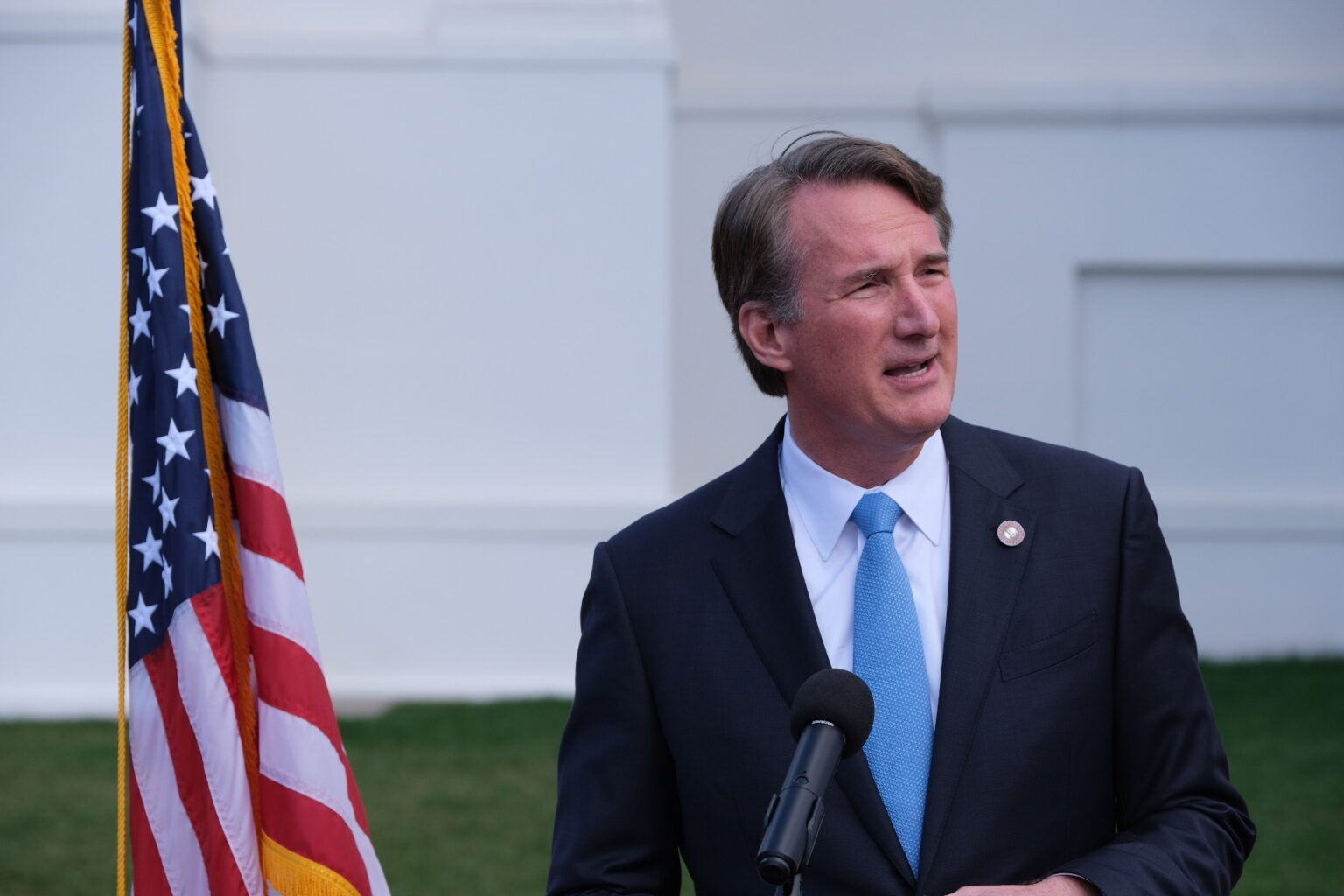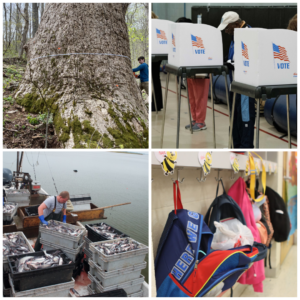13:47
News Story
Judge deems Youngkin’s actions to withdraw Virginia from RGGI ‘unlawful’
Governor’s attempted repeal of RGGI ‘null and void,’ Floyd County Circuit Court judge says
Floyd County Circuit Court Judge Randall Lowe ruled Wednesday Republican Gov. Glenn Youngkin acted unlawfully by withdrawing Virginia from the Regional Greenhouse Gas Initiative, a program aimed to reduce climate changing emissions that has funneled hundreds of millions to the state to deal with the impacts of extreme weather events.
In his five page opinion, Lowe wrote that “the only body with the authority to repeal the RGGI regulation would be the General Assembly. This is because a statute, the RGGI Act, requires the RGGI regulation to exist.”
“For the reasons set out in this opinion, the court finds that the attempted repeal of the RGGI Regulation is unlawful, and thereby null and void,” Lowe wrote.
RGGI background and how we got here
Virginia began participating in RGGI in 2021 after Democrats, with trifecta control of state government the year prior, passed the Clean Energy and Community Flood Preparedness Act (which Lowe referred to as the RGGI Act).
RGGI is a multi-state program in which electricity producers in participating states are required to buy allowances for the emissions they produce.
The proceeds from the allowances are returned to the states, where, in Virginia, about $830 million had been generated for programs increasing flood resiliency and energy efficiency efforts prior to the state’s withdrawal at the end of last year.
According to the 2020 law, 50% of the funds go toward energy efficiency programs that reduce how much electricity is needed, 45% go toward the Community Flood Preparedness Fund, or the flood fund for community-scale flood protection projects, with 5% used for administrative functions.
In Virginia, utilities produce their own electricity and are allowed to recover the costs of the allowances from ratepayers.
For a typical Dominion customer, the recovery amounted to a $2.39 monthly fee, before it was paused amid uncertainty around Virginia’s participation in RGGI. The fee was then added back in the amount of $4.34 for a typical residential customer to make up for when cost recovery wasn’t levied and participation in RGGI continued.
The fee is no longer tacked on to utility bills.
That fee is what Youngkin called a “hidden tax,” when he proposed a regulation in the fall of 2022 to repeal the existing regulation requiring Virginia’s participation in RGGI. The State Air Pollution Control Board approved the repeal regulation in August 2023.
The day of that vote, four groups filed a challenge against the Youngkin administration in Fairfax County Circuit Court. The judge found only one group, the Association of Energy Conservation Professionals, had standing to bring allegations forward and transferred the matter to Floyd County Circuit Court, the jurisdiction where AECP is headquartered.
There, the Floyd County Circuit judge recused himself over a conflict of interest and the office of Attorney General Jason Miyares, representing the Youngkin administration, argued for the case to be reheard in front of the Lowe, who issued his ruling Wednesday.
What the ruling means
Lowe based his decision that Youngkin overreached on precedents set by two cases, Supervisors of Botetourt County v. Cahoon from 1917, and Bean vs. Simmons from 1852.
In the Cahoon case, the court ruled that where this a “duty coupled with the power …usually the power must be exercised,” Lowe noted, adding that “what they are empowered to do … the law requires shall be done.”
The Bean case, Lowe explained, demonstrated that where “public interest and right are concerned,” the public has a right to agency powers being used.
The RGGI Act, Lowe wrote, includes in the first substantive provision that participation in RGGI “shall be incorporated” by DEQ without further action by the air board. The RGGI Act also “hereby authorized” the DEQ Director to participate in RGGI, Lowe pointed out, thereby coupling the duty to participate in RGGI and the power to do so.
“There can be no doubt that the RGGI Act is designed for the purposes discussed in Cahoon,” Lowe wrote. “Because (the AG’s office) lacked the statutory authority to repeal the RGGI Regulation, it is unnecessary to address whether the decision to do so was supported by substantial evidence.”
Had the Youngkin administration “amended,” the RGGI regulation in ways that were still consistent with the law, Lowe added, “it is doubtful that their authority to do so could be challenged. That is not what happened here.”
Reaction from environmental advocates and lawmakers
Environmental groups and Democratic lawmakers had said repeatedly that the RGGI withdrawal was unlawful and hurt Virginians.
Billy Weitzenfeld, former executive director of the Association of Energy Conservation Professionals, said in a statement, “All along we knew that the actions taken by the Air Board and DEQ were wrong.”
His group was granted standing in the case by Lowe because the repeal of the regulation meant the association was injured by losing a source of revenue to carry out their energy efficiency work.
“This is a win for communities across Virginia who have benefited from the state’s participation in RGGI in the past and those that now will have a chance to continue to see those benefits,” Weitzenfeld said.
Chelsea Harnish, executive director of the Virginia Energy Efficiency Council, noted that the revenue from RGGI “cannot be replaced or matched,” since the allowance revenues “exceeded every other source of energy efficiency funding in Virginia combined.”
Members of other environmental groups hailed the judge’s decision as a victory. Mike Town, Executive Director of the Virginia League of Conservation Voters, said the result of Youngkin’s move was, “dirtier air, more communities left exposed to floodwaters, and fewer tools to help Virginians cut energy costs.” Walton Shepherd, Virginia director and senior attorney with the group, added that “as we witness the grim toll of the increasingly dangerous weather in a warming world, today’s decision is good news for all Virginians.”
House Majority Leader Charniele Herring, D-Alexandria, who carried the 2020 law through its passing and pushed for a budget amendment this past session to reinstate Virginia in RGGI, said the decision was a “resounding victory for Virginia’s families.”
“We are proud to stand with every Virginian who benefits from this initiative and will continue fighting to ensure these protections remain intact,” said Herring.
But in response to Lowe’s determination, Youngkin Press Secretary Christian Martinez, said, “We respectfully disagree with the judge’s decision and will pursue an appeal.”
“Governor Youngkin remains committed to lowering the cost of living for Virginians by continuing to oppose the Regional Greenhouse Gas Initiative, which fails to effectively incentivize emission reductions in the Commonwealth,” Martinez said. “Instead, it functions as a regressive tax, hidden in utility, bills passed on to all Virginians.”
Attorney General Jason Miyares, in response to a question about the judge’s decision posed by Cameron Thompson at Richmond television station WTVR on Wednesday, said, “I think you can see from the beginning this is in the governor’s powers and how the law was actually written to the Virginia code. … We obviously have a disagreement in the interpretation of the law and the code.”
Next steps
Lowes’ opinion explains the rationale behind his decision and will need to be followed up by an order to officially repeal the regulation that withdrew Virginia from RGGI, and reinstate the previous regulation requiring participation, explained Nate Benforado, senior attorney with the Southern Environmental Law Center, which represented the AECP. The timing of that order is yet to be determined.
Once the old regulation goes back into effect, DEQ will then need to take the steps necessary to resume participation in RGGI, Benforado said. While the Youngkin administration has stated they’ll be appealing the decision, they’ll need to also ask for a stay, or a pause, if they want to delay resuming participation in RGGI while they challenge Lowe’s decision.
Calling the ruling “validating,” Benforado said, “It is up to the administration on what they want to do next.”
The RGGI program, Benforado added, was “critical” to reducing one-third of emission from independent power producers, since the state’s other landmark law reducing emission from power companies, the Virginia Clean Economy Act, applies only to Dominion Energy and Appalachian Power Company.
“RGGI is really the key, if not the only tool, Virginia has,” Benforado said.
The state’s third major emissions-reducing regulation, which tethered Virginia’s vehicle tailpipe emissions to California’s Advanced Clean Car II standards that ban the sale of new gas powered vehicles starting in 2035, has also been repealed during Youngkin’s tenure. Environmental groups have signaled they’ll challenge that administrative move, also.
A spokesperson for Miyares’ office declined to elaborate on questions from the Virginia Mercury concerning what happens next with the state’s RGGI participation.
“We look forward to defending the commonsense repeal of this counterproductive program on appeal,” the spokesperson said.
Our stories may be republished online or in print under Creative Commons license CC BY-NC-ND 4.0. We ask that you edit only for style or to shorten, provide proper attribution and link to our website. AP and Getty images may not be republished. Please see our republishing guidelines for use of any other photos and graphics.





